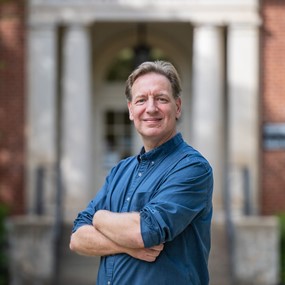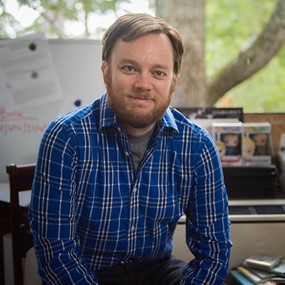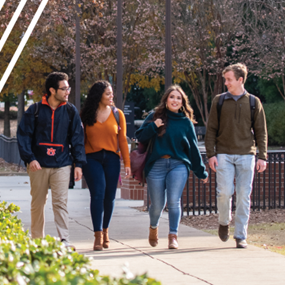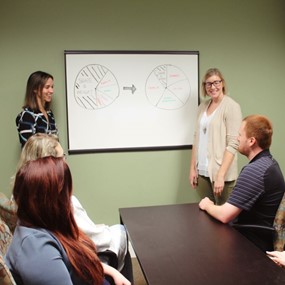Robinson honored with Leischuck Endowed Presidential Award for Excellence in Teaching
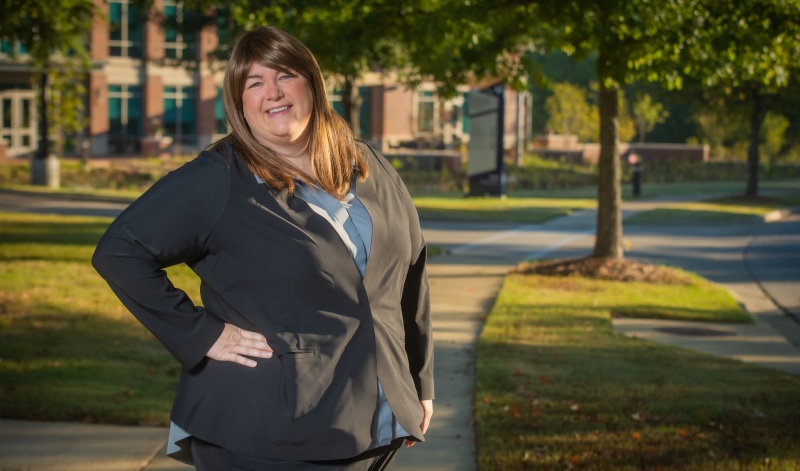
The right educator, offering the right guidance at the right time, can be a transformative figure in the lives of college students, and Jennifer Robinson has committed herself to being that type of difference-maker at Auburn University.
The Alumni professor from the Department of Psychological Sciences in the College of Liberal Arts is adored by her students, whom she provides with knowledge through top-flight instruction, experience-driven advice from a caring heart and the foundation for successful careers after graduation. For her commitment to her students, her dedication to life-changing research and service to military veterans, Robinson has been selected to receive the Gerald and Emily Leischuck Endowed Presidential Awards for Excellence in Teaching.
Gerald and the late Emily Leischuck, 1964 graduates and retired Auburn University administrators, created the Endowed Presidential Awards for Excellence in Teaching in 2005 to recognize two full-time, tenured faculty members who have demonstrated effective and innovative teaching methods, along with a continuing commitment to student success through advising and mentoring. Robinson was selected for this year’s distinction and a $10,000 prize along with Paul Holley, professor and director of the Center for Construction Innovation and Collaboration in the College of Architecture, Design and Construction’s McWhorter School of Building Science.
The special honor has been motivational for Robinson, not only personally, but to urge other professors to put themselves out there for similar distinctions.
“I think it’s an incredibly special honor when your students feel that strongly and highly of your investment in them,” said Robinson, an Auburn professor since 2012. “It’s also nice to get recognition as a faculty member. I hope that some day I’ll be able to provide that same kind of recognition or a similar mechanism for faculty, because I think it’s really important. I’m so grateful to the Leischucks for providing such a distinguished award.
“You feel a sense of responsibility to usher forward the same mission that got you where you are and to also just encourage other faculty who are doing amazing things to apply for Auburn’s faculty awards. I do feel like there is a responsibility that comes with this type of recognition to continue teaching at the highest level and try to be both inspirational and motivational. I think in the last year, we’ve really been tested to keep the ‘classroom,’ which can sometimes be a computer screen, engaging.”
Robinson–who earned master’s and doctoral degrees in experimental psychology from Case Western Reserve University in Cleveland–teaches both undergraduate and graduate students. Her classes range from cognitive neuroscience and introduction to psychology to research methods in psychology, and she is heavily involved with the Auburn University MRI Research Center.
An inherent passion for the work, as well as a love for the students, is what drives Robinson.
“Auburn is just such a special place,” said Robinson, who holds appointments in the School of Kinesiology and Department of Electrical and Computer Engineering. “I love what I do, so, that is very helpful. I think when you are doing things that you love, it intertwines with your regular life. So, I’m sure my work-life balance is a little off, but I also find a lot of joy in what I’m doing, so, it’s soul-filling.
“It really is a pleasure, and honestly, my students are phenomenal. My graduate students make life a lot easier on me, and they pick up that it takes a village to accomplish anything. They are kind, brilliant and hard-working team players, and I’ve found that when you surround yourself with really great people, great things happen.”
Mentoring as a methodology
Robinson remembers what it’s like to be a college student, including one who may not be sure about where their path may lead.
“I thought for sure I knew what I wanted to do until I was a year away from graduating and found something else I was way more interested in,” she said. “I was like, ‘Oh, shoot, now what?’”
Helping her students not only learn the material, but also have the “light bulb moment” is a thrill for Robinson.
“I think that’s the beauty of this career, that you get to see those moments regularly, and not many people have a career where you get that constant reinforcement,” said Robinson, the 2017 Psi Chi International Honor Society Teacher of the Year. “There’s nothing really like it to see that light bulb go off or even see them go off into a field because they found inspiration in your class. Helping them find their passion is pretty special.”
Robinson is no stranger to lofty honors, winning the 2020 College of Liberal Arts Teaching Excellence Award and the 2019 Alumni Excellence in Teaching Award. She takes her role as a mentor seriously and thinks about the emotions of students’ parents who may be trepidatious about their children leaving the nest for college life.
“I have these young adults who are at such an awesome time in their life, and they’re very vulnerable and malleable, and they’re trying to figure things out,” said Robinson, who serves on the Auburn Graduation Committee, the College of Liberal Arts Budget Committee and the Auburn Institutional Review Board. “It’s such an honor to be a part of that journey, and to get to share that time with them.
“Then I think from the parent side, the parents are letting go of their kids for the first time into a new environment where they’re trying to figure out life. We have the honor of taking that position to a degree and being mentors and trying to help them navigate that next step which sets the foundation for the rest of their life. To me, that is such a tremendous honor.”
Robinson has spearheaded the Auburn University Brain Camp, or AUBC, for high school students since 2013 and provides opportunities for students to learn about functional magnetic resonance imaging, or fMRI, and psychophysiology as part of their curriculum. She promotes an engaging and welcoming atmosphere in class and the laboratory, committing herself to four key qualities of emphasis–commitment, enthusiasm, respect and scholarship.
Her students know Robinson cares about them and has their best interests at heart.
“In the classroom, Dr. Robinson epitomizes what is expected of educators at the collegiate level,” wrote Kate Conkey, an Auburn doctoral candidate and colonel in the military police who was a student of Robinson’s, in a recommendation letter. “Intelligent, informed and personable, Dr. Robinson connects easily with students and creates a classroom where students are engaged and enjoy learning. Her passion for education and dedication to student development is an undeniable asset to Auburn University.”
Cutting-edge research changing lives
Robinson runs the Cognitive and Affective Neuroscience, or CAN Lab, participates in the Human Brain Mapping Mentor Program and directs the Cognitive and Behavioral Sciences, or CaBS, doctoral program. She uses those endeavors to further research about the brain, examining how different regions are interconnected and relating her findings to topics like post-traumatic stress disorder, or PTSD.
Robinson’s research uses fMRI and psychophysiological techniques to investigate the interplay of emotions and cognitive thought, and her lab is one of the only labs in the world to combine these technologies.
“I don’t know of any university I’ve been at that makes imaging and scanners so accessible to students,” said Robinson, who has published more than 50 peer-reviewed articles and contributed to two books. “Auburn is very unique in that the Auburn University MRI Research Center, housed in the [Ginn] College of Engineering under the direction of Tom Denney, is so gracious and generous about allowing us to use the scanner for teaching, and obviously, for research. Having the opportunity to show students the magnificence of their own brain is a powerful teaching and learning tool.
“To be able to say, ‘Every thought that you’ve had, every memory, every personality trait is housed in this small organ in your head.’ And we can take a picture of that in a couple of minutes, and we can see how it works.’”
Robinson, who serves as associate editor of Frontiers’ “Brain Imaging Methods” journal and has been a grant reviewer for the National Institutes of Health and the National Science Foundation, has long been fascinated by the brain.
“Everything comes from that command center,” said Robinson, who won the 2016 President’s Outstanding Collaborative Units Award for a neuroscience partnership with seven other professors. “I think giving students an appreciation for just how important that is and how unique that organ is compared to all the others is important. It’s fascinating how impressive our brains are.
“I’ve always been interested in the mind-body connection, and just how much of our mental health can affect our physical health. So, I was always interested in medicine and making people’s lives better. I have a servant’s heart, and helping others brings me a lot of joy.”
Through her research, Robinson hopes to advance science and learn more about the brain.
“We don’t know enough about the brain, so I think inspiring the future generations of neuroscientists and getting folks interested in the brain is crucial,” said Robinson, who has been awarded more than $300,000 in grants the last five years. “We don’t have a cure for almost all neurological or psychiatric conditions. We have treatments that can slow progression, but we really don’t have cures. So, I’m hoping that this new generation will be able to usher in a new age of medicine.”
A service to those who serve
Her servant’s heart has carried over into the military realm. Robinson works routinely with the Veterans Resource Center, from obtaining grants to helping veterans deal with PTSD.
“There’s always been a very special place in my heart for folks who have fought for our country and given me opportunities that most don’t get,” said Robinson, the 2019 Veteran’s Advocate Award recipient from the Auburn Student Veterans Association. “Unfortunately, women don’t get opportunities to go and get Ph.D.s everywhere in the world. I think sometimes we forget just how privileged we are to live in the United States, and I don’t think we have done a terribly awesome job of taking care of veterans when they come back home from war.
“Post-traumatic stress disorder is just tough to deal with in general because it’s so complex and so different. I never wore a uniform, but I feel like this is the way I can give back in that capacity, to try and help on the back end of things. I guess the goal of most research is to learn so you can apply it to practical things to make people’s lives better.”
An environment in which to thrive
Robinson is invigorated by being part of a team of elite faculty in the Department of Psychological Sciences.
“Psychological Sciences has some pretty phenomenal educators who balance everything really, really well,” she said. “I think being surrounded by faculty who have figured out how to be successful educators and researchers who are willing to mentor junior colleagues creates a culture of excellence.”
An Auburn resident for nearly a decade, the Ohio native has a special place in her heart for the Plains.
“It’s been a dream come true and so fun,” Robinson said. “It’s not just that I’m blessed to be in a career that I love, but the Auburn community is extraordinary.
“It’s a vibrant community, really. I love my hometown of Lakewood, Ohio. It set the bar very high, but Auburn does a really good job of making me feel at home. I love it here.”



